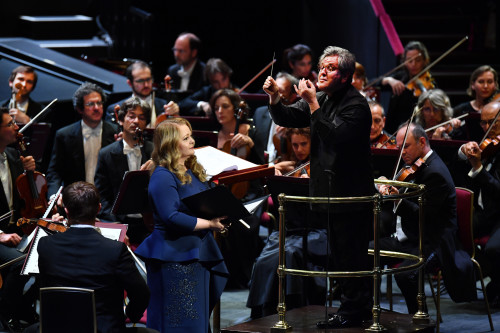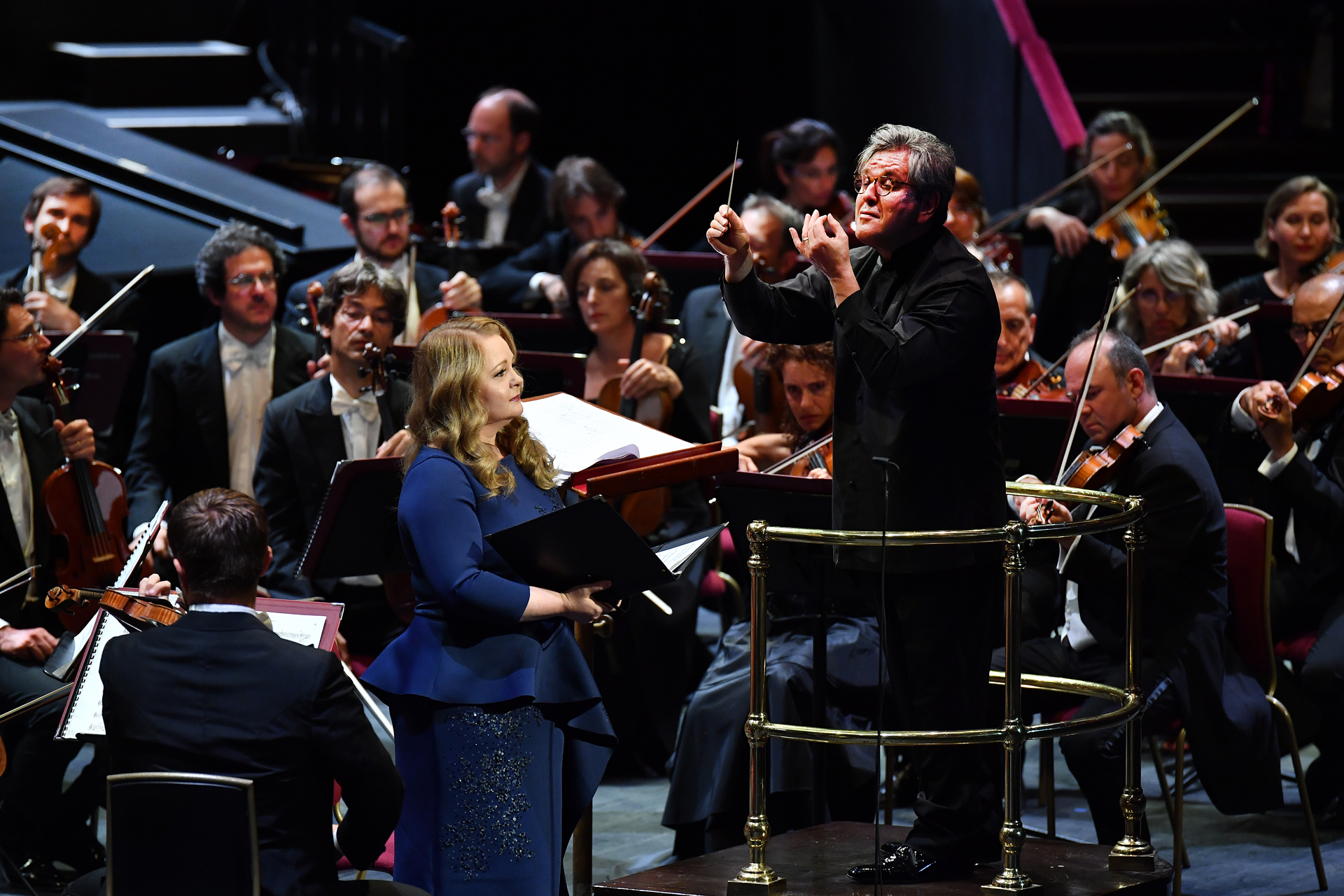
 United Kingdom PROM 37 – Haydn, Bernstein, Mahler: Elizabeth DeShong (mezzo-soprano), Orchestra dell’Accadmia Nazionale di Santa Cecilia, Rome / Sir Antonio Pappano (conductor). Royal Albert Hall, London, 10.8.2018. (CC)
United Kingdom PROM 37 – Haydn, Bernstein, Mahler: Elizabeth DeShong (mezzo-soprano), Orchestra dell’Accadmia Nazionale di Santa Cecilia, Rome / Sir Antonio Pappano (conductor). Royal Albert Hall, London, 10.8.2018. (CC)

& Sir Antonio Pappano (conductor) (c) BBC/Chris Christodoulou
Haydn – The Creation: Representation of Chaos
Bernstein – Symphony No.1, ‘Jeremiah’
Mahler – Symphony No.1 in D
I noted with interest how the programming of this concert mirrored that of Marin Alsop and the LSO at the Barbican in November last year (review) yet the outcome differed completely in effect. The addition of the Haydn was the most obvious difference, presumably a nod to Old Testament links. From ‘nothing’, ‘God’ made man: the texts of the ‘Jeremiah’ symphony come from the Old Testament, a text which also holds the story of the Biblical creation myth. The link seemed tenuous, frankly, ladled on by leaving no break between the two pieces. Yes, Bernstein had a well-known affinity to Haydn and yes, there is a link between the bases of the pieces; but musically it was a less than convincing gesture.
The Haydn performance itself under Pappano was intelligently done, despite the distraction of an over-insistent mobile phone: worlds collided as the planet birthed itself into the arms of Nokia, an accidental comment perhaps on how far we have(n’t) come since the Earth’s genesis. A lovely reedy bassoon and pretty much vibrato-free strings were the highlights of Pappano’s reading.
Another difference between Alsop and Pappano was the timing of the entrance of the solo singer: Pappano had Elizabeth DeShong enter right at the outset – that meant a long wait for her, to be sure, but there was no interruptive entrance applause as greeted Alsop’s soloist, Jamie Barton. The Bernstein Symphony received a generally satisfying performance under Pappano, but Alsop has the authority of being mentored by Bernstein; Pappano comes from outside of the line and adds a sense of directness that was refreshing. The sound of the Santa Cecilia orchestra carried significant depth, and the Scherzo was a miracle of metrical play. If the first movement felt a little on the swift side, this was part of Pappano’s deliberate no-nonsense approach. Elizabeth DeShong’s account of the final ‘Lamentation’ was expert, her full voice having no problems with the lower register. Her sound was burnished, and yet she could fly over the orchestra when required. She impressed massively in her Covent Garden debut – also with Pappano when, at the Royal Opera House, she took the role of Suzuki in Butterfly – and one hopes her career path will continue onwards as successfully.
Mahler’s First Symphony is a Proms favourite. The list of reasons is far too long to go into but having brass members stand up at the end surely helps, as do the huge climaxes and, probably, the universal appeal of a minor-key ‘Frère Jacques’. If Pappano was no-nonsense in Bernstein, he was doubly so in Mahler. Not that one would have guessed that from the opening: one had to admire the way it was actually difficult to determine the actual starting point, so quiet were the string octaves; the awakening of Nature was decidedly swift, though (well disciplined woodwind), so at least the exposition repeat felt natural.
Here, perhaps, as in the Haydn, there was another birthing? Was this another link? Anyway, there was lots of detail (antiphonal violins, which is so prevalent these days it almost seems like one should comment on exceptions) but little atmosphere and the movement’s great climax seemed to come out of nowhere because of a lack of structural preparation.
The Trio of the second movement contained some of the most characterful playing of the evening, but the highlight of the performance was the slow movement. A lovely, fragile double-bass solo launched the funeral procession that held a characterful contrasting section. The finale’s explosive opening seemed to lose some of its primal force, but as it continued it seemed the level of detail in rehearsal paid off; here the structural awareness seemed more in focus.
As encores we had the ‘Italiana’ from Respighi’s Ancient Airs and Dances (a stunning performance, actually the true highlight of the night) and the galop from Rossini’s Guglielmo Tell.
Colin Clarke
